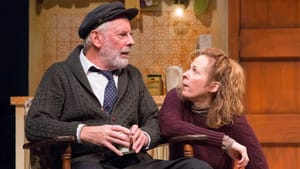Stay in the Loop
BSR publishes on a weekly schedule, with an email newsletter every Wednesday and Thursday morning. There’s no paywall, and subscribing is always free.
Humanity and nature on an Irish farm
Shanley’s ‘Outside Mullingar,’ by PTC (1st review)

Why do the Irish (and Poles and Slavs, too) make better coal miners than, say, Hispanics or Italians? Why, for much of the 20th century, were the newsrooms of major American newspapers staffed almost entirely by two ethnic groups — the Irish and the Jews — that seemed at first glance to have nothing else in common?
The first question has to do with inherited traditions of working the soil from dawn to dusk in near-solitude. (Miners can spend eight hours a day alone.) The second concerns an inherited affection for written and spoken language as a refuge from body language.
The four characters in John Patrick Shanley’s Outside Mullingar offer an engaging opportunity to channel the inner Irish that lurks within many of us. The play covers five years in the lives of two families that have worked neighboring sheep and cattle farms for more than a century and now must confront the passing of the older generation. It’s hard, repetitive, boring work, but they accept their lot in life much like the animals they tend all day long — as the natural order of things. They find release not in sex, violence, or histrionics — the customary staples of drama — but in gentle conversation laced with charming metaphors (a neighbor child shrank “like a sock in the wash”; a futile task elicits the comment that “You might as well ask the calendar to stop naming the days”). Under the skillful direction of Mary B. Robinson, only twice in this 90-minute drama does any character physically touch anyone else — and what a cathartic release it is when they finally do.
Echoes of Fiddler
The central character, Anthony Reilly, seems a 40-something galoomph of a loser: a poster boy for low self-esteem who has faithfully tended his father’s land but seems to lack the passion to fight for anything. (“Some of us don’t have joy,” Anthony says in his own defense, “but we do what we must.”) For 30 years, he’s been dancing around his feisty neighbor, Rosemary Muldoon, without getting up the gumption to pop the question, driving Rosemary into ever-deeper fury. Anthony has spent his whole life under his father’s thumb, but his seeming inability to assert himself leaves his father doubtful as to whether Anthony is a fitting heir for the family farm.
These people say hurtful things to each other, but they’ve spent too much time close to the earth to take mere words to heart for very long. And eventually they do solve each other’s problems. We keep waiting for Anthony to shout (to paraphrase Motel in Fiddler On the Roof), “Even a poor farmer has a right to some happiness!” — and he does, but with a simplicity that makes his transformation all the more rewarding. Anthony and Rosemary, we gradually come to see, are ideally suited to each other: All those years of talking to the soil and the sheep have left them both a little crazed, and isn't it gratifying when two crazy people finally find each other?
A younger Colleen Dewhurst
Shanley’s compelling script is bolstered by a wonderful cast in the Philadelphia Theatre Company’s production. Anthony Lawton as Anthony totally embodies his perpetually expectant, perpetually dissatisfied character. As Anthony’s and Rosemary’s aging parents, David Howey and Beth Dixon epitomize our best ideas of low-key Irish charm almost every time they open their mouths. These are people I would like to spend more time with.
The driving force in the cast, as in the script, is Kathleen McNenny as Anthony’s combative feminist neighbor, Rosemary. (When Anthony insists that he’s too tall for her, she replies, “Men need height to balance the truth and goodness of women.”) McNenny put me in mind of the young Colleen Dewhurst — same husky voice, same determined spirit, same tough exterior concealing a soft heart underneath.
One can question a few of Shanley’s plot details. Even in a mechanized age, it takes more than one person to work a farm, which both Rosemary and Anthony are trying to do. Most farm families have many kids for precisely that reason, but Rosemary and Anthony seem devoid of nearby siblings or cousins. The play takes a bit too long for the two of them to get together, as inevitably they must. For that matter, it’s hard to believe that two such unattached neighbors wouldn’t have been hitched — or found other spouses — long before 30 years had passed. Notwithstanding the mantra of theater and film, marriage is more than a matter of love and chemistry; especially in rural cultures, it’s often an economic necessity.
But these are minor quibbles. It’s been some time since the final curtain of any play found this wizened critic with tears in his eyes. With its authentic but uplifting message about human connections and continuity, Outside Mullingar spoke to me. And I’m not the least bit Irish.
To read another review by Steve Cohen, click here.
What, When, Where
Outside Mullingar. By John Patrick Shanley; Mary B. Robinson directed. Philadelphia Theatre Co. production through December 28, 2014 at Suzanne Roberts Theatre, 480 S. Broad St. (at Lombard), Philadelphia. 215-985-0420 or philadelphiatheatrecompany.org.
Sign up for our newsletter
All of the week's new articles, all in one place. Sign up for the free weekly BSR newsletters, and don't miss a conversation.
 Dan Rottenberg
Dan Rottenberg